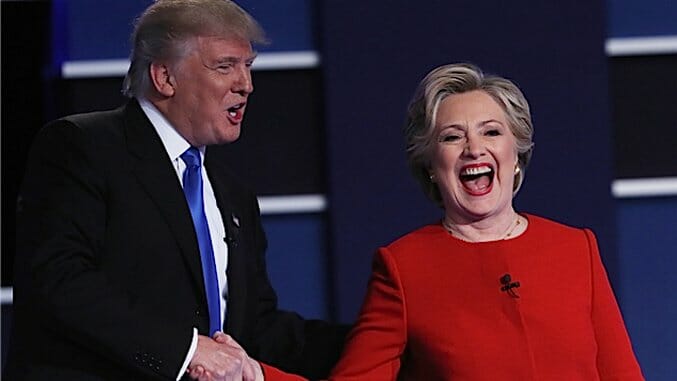America’s Electoral Politics Are Designed to Be an Instrument of Corporate Control
Photo by Spencer Platt/Getty
Surely I’m not the only person living in the United States who can no longer stomach our mass media’s masturbatory coverage of the undying presidential election. Trying to maintain interest in all the manufactured campaign drama is like trying to watch a baseball game straight through—so, virtually impossible for anyone whose general psychology falls within, say, two standard deviations of normal.
How many articles can one read about Donald Trump’s relationship with the “birther” movement? The man is an imbecile; get over it. Does anyone actually believe that the people who make up Hillary Clinton’s “basket of deplorables” will be given pause by evidence that Donald Trump is susceptible to childish right-wing conspiracy theories? That’s what attracted them to the metaphorical basket in the first place. If anything, Trump’s recent disavowal of his “birther” past irritates the majority of his voters.
Who, then, are outlets like Slate addressing with articles like this one Is there a sector of American voters who are still on the fence about whether Donald Trump is a good presidential candidate? I seriously doubt it. People made up their minds about Donald Trump a year ago; there’s nothing the media can do about it. In fact, there’s good reason to believe that the mainstream media’s near-unanimous hostility to Trump is going to backfire, if it hasn’t already.
Trump’s whole shtick is that the media, along with the political establishment, is against him, and moreover that the media is fundamentally dishonest. These things are true, albeit not in the sense that Trump means. Nevertheless, when his supporters see anti-Trump headline after anti-Trump headline, the idea that he’s being unfairly targeted is in their minds reinforced. And if that weren’t enough, they’re now being directly attacked by Hillary Clinton and her media surrogates, which seems to me an odd strategy. Perhaps it will result in a mass defection of moderate Trumpists who see now, with Hillary’s help, how deplorable the company they’ve been keeping really is (a neoliberal Democratic partisan can dream, I suppose). The more likely consequence, however, and this is reflected in recent polls, is a sort of deplorable uprising. We’re gonna need a bigger basket, as chief Brody would say.
But then media outlets like Slate, who cater to a pseudo-left audience, really have no choice other than to pile on Trump, which they’ve been doing for over a year now. Their primary function, their job, is to shore up the Democratic nominee, however vile that person might be, and they have to do this all the way up to Election Day. Of course, they get to vary the targets of their criticism during the primary season, as Bernie Sanders will tell you, but by mid-June it’s all about castigating the Republican nominee (with a few third-party hit pieces thrown in for good measure). The problem is that, by this time, the whole spectacle is already about 500 days old, and all the ways in which one can assail a given candidate have been thoroughly exhausted.
This is why pundits from both ends of the aisle keep writing the same articles over and over again—and why most people stop reading them. They’re obliged to cover the election, even though they have nothing remotely new or interesting to say. One pities the plight of the poor political pundit. How utterly dull it must be for CNN’s “political analysts” to go on the air night after night and bicker with each other about whether Donald Trump’s latest tweet ought to disqualify him as a presidential candidate, all while pretending that what they’re talking about actually means something.
The point here, if the reader hasn’t surmised it, is that our election season is too bloody long. Everyone knows it, knows how ludicrous it is, and yet most of us play along all the same, which is precisely what we’re supposed to do.
There’s a very straightforward reason why our presidential horserace takes the form of a double marathon (or a baseball game with extra innings): it enables the corporate world to maintain overwhelming control of our politics.
Most honest observers agree that our duopolistic political system, in which both major parties are subservient to the ruling class, is the most significant barrier to real democracy in this country. Neither the Democrats nor the Republicans, despite the false dichotomy incessantly pushed by the media, represent the interests of the American people in any meaningful sense. And why should they? After all, elected officials from either party have donors, not voters, to thank for their success.
In 2012, Barack Obama and Mitt Romney each raised more than $1 billion for their respective campaigns, whether directly or via super PACs. As of July 31, Hillary Clinton and her affiliates had raised over $690 million, more than twice as much as Donald Trump. These are staggering sums of money, and the effect is obvious: to have even a remote chance of becoming president, a candidate must be able to solicit hundreds of millions of dollars in campaign contributions, or else be able to self-finance his or her campaign. This effectively rules out any non-establishment candidate, particularly one representing a third party and aiming to subvert the political/economic status quo. (Bernie Sanders’ against-all-odds performance in the primaries was the exception that proves the rule, as it were, but just imagine if he’d run as an independent—his campaign would have been dead in the water.)
All of which was a central, or perhaps the central, theme of Bernie Sanders’ so-called revolution, and he certainly deserves credit for that. Prior to his populist insurrection, nobody under the age of 30—and few over that age—could tell you what Citizens United meant. Now, campaign finance reform is toward the top of the mainstream progressive agenda, just a couple notches below eliminating use of the male pronoun in academia. Hats off to Bernie for that!